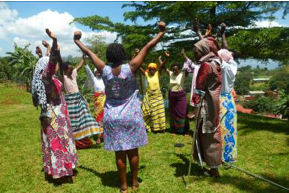
Continuing our series of articles from our Annual Report 2022/23, we outline here our work on our Community Counselling Initiative.
Through counselling for women victims of genocide rape, Survivors Fund (SURF) and Foundation Rwanda have provided counselling in a well-structured peer support approach to a total of 840 mothers through our Community Counselling Initiative. Of these, 80 received counselling during 2022.
The project includes in-depth monitoring and evaluation, surveying the women before, during and after working in the counselling groups. This provides the ability to track the changes in their circumstances and monitor their wellness, whilst also providing feedback to ensure that the counselling groups are having a positive impact and are helpful to the women.
These women, who were previously marginalised, stigmatised and alone in their trauma, can build their confidence and self-esteem, increase their knowledge, enhance positive emotions and reduce shame. The counselling groups also helped to improve relationships with their children and family.
Since 2016, we have extended the approach of group counselling to develop community counselling for the children of the women survivors too, as youth born of rape face great challenges related to trauma and social stigma as well. They are described as carriers of “deviant genes” and are often marginalised in their families and communities. In instances occurring during wartime, many societies have adopted hateful labels such as “children of shame” or “children of bad memory”.
Many mothers are starting to speak out against the negative perceptions and stigma associated with children of rape and disclosing to their children the circumstances leading to their birth. Many mothers attest that after disclosure the children now youth, need psychological support.
The youth retreats in 2022 brought together 70 youth to receive group counselling, reproductive health training and career guidance. This has provided vital support and assistance otherwise unavailable to them.
“I was 14 years old during the genocide and we were 7 children in my family but all of them in addition to my parents were slaughtered. I was raped by a number of men until I wish I would be killed instead. I thought that to survive was impossible, but I survived by chance. When genocide was over, I was a homeless person like many other survivors.
Then, I was taken to an orphanage that was established by the Catholic nuns. But after three months the nuns found out that I was pregnant.
To me, I did not know that I was pregnant. After knowing this, I felt uneasy and I made several suicide attempts but the nuns always watched me closely. After some time, I gave birth to a child in the orphanage and told the nuns that as they prevented me from committing suicide, they would also prevent me from breastfeeding the child of perpetrators. They asked me for the child’s name, and I said, Urwibutso Rubi (a bad memory). After that they kept looking after me and my child. The nuns took care of the child as I wanted to show everyone that I had no baby from perpetrators and feeling that, to not know the father of the baby is an opportunity for me. A time came and I was obliged to leave the orphanage, which means I had to take my baby with me. Though I felt I took someone else’s baby. I couldn’t accept that the baby is mine. My boy is now grown up, and there have been a bad relationship between him and myself, until I joined a counselling group for the first time.
After genocide, life kept being hard. I lived a miserable life with my baby boy. I lost hope and made many more suicide attempts. What made me cry all the time is the way that I was not neither a woman, nor single, which makes me feel that I am nothing in the society. I was always ill without knowing why, as all my body was painful.
I got a chance to be selected as one of the counselling group members for a period of six months. I felt that it was impossible to help me, based on how I was always prone to mood swings. I thought no one would tolerate to live with me for 6 months except my child who only did so because he had no other choice. I clearly saw that my child was to blame for the bad living conditions that I have faced.
I thought that I was the only one who was raped during genocide before we started the counselling sessions. I have not met other women before in my same situation and we talked about what happened to us during the genocide until we started the counselling group. The counselling sessions have helped me a lot, to the point that I now feel that I have a place in society. Other women started sharing their testimonies, and feeling that I am not alone, I was glad to have found a new family.
Group counselling has made me a new person, I started loving my boy which could not have happened before joining counselling sessions. I managed to tell my boy the truth of what happened and now we are together as a family. I love him. Now I have friends and a new family. When I have problem, I have friends with whom I can talk about it without crying alone. After 28 years, I feel genocide has ended now, as I have finally started a new life.”
